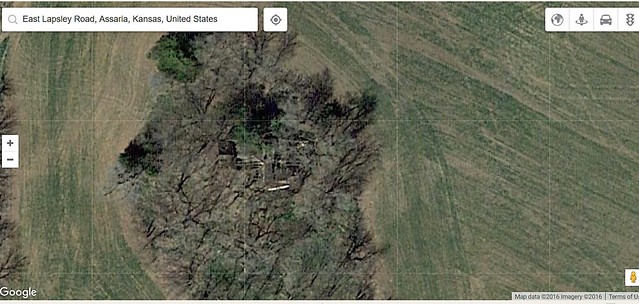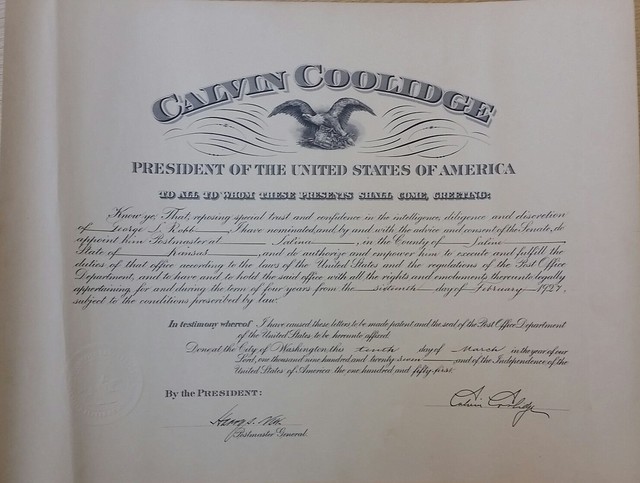
I found my Great Grandfather Thomas Robb’s farm home on Google Earth yesterday. You can see its right angles hiding in a grove of trees in the picture above which I copied. In a wide field image you can see the Smokey Hill River bending around it to the west (left) This screen capture shot shows that you reach the farm by the Lapsley Road. Larry Lapsey was my Great Grandfather’s neighbor a former escaped slave who reached Salina, Kansas during the Civil War and found the area settled with folks who had dug “bank” houses into the hillside. Thomas Robb, eventually built this now abandoned house and my Grandfather being the youngest of six siblings was the only child not born under the sod. I visited the wreck ten years ago and have heard that it has since been torn down.
I have two sources of information on Larry Lapsley. The first is a speech my Grandfather wrote for a long time literary organization in Topeka, Kansas called the Saturday Evening Literary Club and the second is a reprint of the story Lapsley told a young neighbor girl which was reprinted in a Kansas Historical Quarterly.
Pantle, Alberta, editor. “The Story of a Kansas Freedman.” Kansas Historical Quarterly 11 (November 1942): 341-369. Larry Lapsley’s story of his escape from slavery during Civil War and settlement in Saline County.
I don’t know which was written first. I suspect my Grandfather’s speech led to the later publication.
Long time readers will know that I am in a lather to write a book about my Grandfather. I recently organized the last of the personal correspondence I copied in Topeka chronologically. I’ve nibbled at the reading and keep making interesting discoveries which cry out for follow-up research. For instance, my Grandfather’s closest sibling in age, Bruce Robb, wrote him shortly after it was apparent that his little brother George had survived the war albeit shot up. In that letter Bruce asks lots of geopolitical questions. What did George think of the abdication of the Kaiser, How were things in France, and then mentions he has just read William Allen White’s book The Martial Adventures of Henry and Me I knew of White but had never heard of this book. Its not listed on White’s Wikipedia Page but it must have gotten into the public domain because I found it on the web along with its light-hearted illustrations of White and his fellow Kansas newspaper editor, Henry, as they take a tour of the Western Front before the Armistice.
William Allen White was the publisher/editor of the Emporia Gazette who parlayed his small town writing into a nationally recognized force. He was one of Teddy Roosevelt’s muckrakers. He earns many mentions in Doris Kearns Goodwin’s The Bully Pulpit about TR, William H. Taft and the progressive journalists of the turn into the 19th century.
Over the past year I’ve wondered if White ever wrote about my Grandfather’s war experiences. The answer seems to be yes and no. The White book talks about the military hospitals the publishers visited on their tour. My Grandfather spent November and December recovering in those facilities although I’m sure the two didn’t meet there. Later when my Grandfather was appointed the the post as State Auditor of Kansas every newspaper in the state had to mention his war experience and White’s Emporia Gazete was no exception. The Gazette is one of the most completely available Kansas newspapers on Newspapers.Com. and I’ve printed out many of the Gazette election stories that mention my Grandfather.
One of the little treasures I discovered during that period of hospitalization was a letter to my eventual Grandmother, Winona McLatchey (they would wed six years later). He had met her in the Iola, Kansas schools and she was one of a couple women he coresponded with during the war. In the letter he describes being “grooved” by a bullet or shrapnel. He makes what must have been a hideous injury sound like a flesh wound. In the medical reports he had an internal infection perhaps peritonitis that sounded a lot more severe than he described.
I have a couple particularly areas I’d like to emphasize in any book I crank out. For one thing I’d like to emphasize the less blood thirsty partisan divide my Grandfather experienced and secondly his thoughts on black/white relations.
Lately I’ve had a hard time sleeping through the night because I wake up to stew about national politics. Perhaps that’s an improvement. For much of my first three years back on the Duluth School Board it was Board politics that kept me sleepless.
Some of our most disagreeable Presidents have been our most productive. Woodrow Wilson who my Grandfather lamented voting for in 1916 is a case in point. I’ve just been reading about Woody again in a book I bought a couple years ago by David Pietrusza. Its called “1920 The Year of the Six Presidents.”
1920 would see the Wilsonian dream fade and the beginning of three straight Republican Administrations in the Roaring Twenties. If my Grandfather had been willing to entertain some political heresies in his youth he would become a confirmed Republican during this decade. Being selected by three successive Republican presidents in a row to serve as the Postmaster of Salina, Kansas, cemented that loyalty. Here’s one of three certificates in the Kansas Archives to attest to this. They have one for Harding and Hoover as well.

I started Pietrusza’s book last night after reading a couple chapters of the prophet Ezekiel. I got a better night’s sleep thinking about past presidents than future ones.
